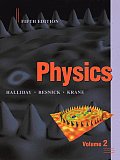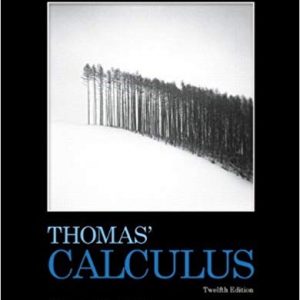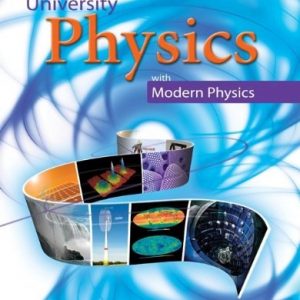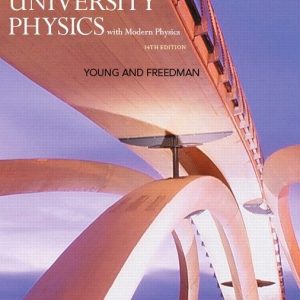Instant download Solutions Manual to accompany Physics 5th edition vol 2 9780471401940 pdf docx epub after payment.

Product details:
- ISBN-10 : 0471401943
- ISBN-13 : 978-0471401940
- Author: David Halliday; Robert Resnick
Written for the full year or three term Calculus-based University Physics course for science and engineering majors, the publication of the first edition of Physics in 1960 launched the modern era of Physics textbooks. It was a new paradigm at the time and continues to be the dominant model for all texts. Physics is the most realistic option for schools looking to teach a more demanding course. The entirety of Volume 2 of the 5th edition has been edited to clarify conceptual development in light of recent findings of physics education research. End-of-chapter problem sets are thoroughly over-hauled, new problems are added, outdated references are deleted, and new short-answer conceptual questions are added.
Table of contents:
Chapter 25 Electric Charge and Coulomb’s Law 567
25-1 Electromagnetism: A Preview 567
25-2 Electric Charge 568
25-3 Conductors and Insulators 571
25-4 Coulomb’s Law 573
25-5 Continuous Charge Distributions 576
25-6 Conservation of Charge 580
Questions and Problems 581
Chapter 26 The Electric Field 587
26-1 What is a Field? 587
26-2 The Electric Field 588
26-3 The Electric Field of Point Charges 590
26-4 Electric Field of Continuous Charge Distributions 592
26-5 Electric Field Lines 595
26-6 A Point Charge in an Electric Field 597
26-7 A Dipole in an Electric Field 600
26-8 The Nuclear Model of the Atom (Optional) 602
Questions and Problems 603
Chapter 27 Gauss’ Law 611
27-1 What is Gauss’ Law All About? 611
27-2 The Flux of a Vector Field 612
27-3 The Flux of the Electric Field 613
27-4 Gauss’ Law 616
27-5 Applications of Gauss’ Law 617
27-6 Gauss’ Law and Conductors 621
27-7 Experimental Tests of Gauss’ Law and Coulomb’s Law 624
Questions and Problems 626
Chapter 28 Electric Potential Energy and Potential 635
28-1 Potential Energy 635
28-2 Electric Potential Energy 636
28-3 Electric Potential 639
28-4 Calculating the Potential from the Field 640
28-5 Potential Due to Point Charges 641
28-6 Electric Potential of Continuous Charge Distributions 644
28-7 Calculating the Field from the Potential 646
28-8 Equipotential Surfaces 648
28-9 The Potential of a Charged Conductor 649
28-10 The Electrostatic Accelerator (Optional) 651
Questions and Problems 652
Chapter 29 The Electrical Properties of Materials 661
29-1 Types of Materials 661
29-2 A Conductor in an Electric Field: Static Conditions 662
29-3 A Conductor in an Electric Field: Dynamic Conditions 663
29-4 Ohmic Materials 666
29-5 Ohm’s Law: A Microscopic View 668
29-6 An Insulator in an Electric Field 670
Questions and Problems 672
Chapter 30 Capacitance 679
30-1 Capacitors 679
30-2 Capacitance 679
30-3 Calculating the Capacitance 681
30-4 Capacitors in Series and Parallel 683
30-5 Energy Storage in an Electric Field 685
30-6 Capacitor with Dielectric 687
Questions and Problems 690
Chapter 31 DC Circuits 701
31-1 Electric Current 701
31-2 Electromotive Force 703
31-3 Analysis of Circuits 704
31-4 Electric Fields in Circuits 709
31-5 Resistors in Series and Parallel 710
31-6 Energy Transfers in an Electric Circuit 713
31-7 RC Circuits 713
Questions and Problems 716
Chapter 32 The Magnetic Field 725
32-1 Magnetic Interactions and Magnetic Poles 725
32-2 The Magnetic Force on a Moving Charge 727
32-3 Circulating Charges 731
32-4 The Hall Effect 734
32-5 The Magnetic Force on a Current- Carrying Wire 736
32-6 The Torque on a Current Loop 738
Questions and Problems 740
Chapter 33 The Magnetic Field of a Current 749
33-1 The Magnetic Field due to a Moving Charge 749
33-2 The Magnetic Field of a Current 752
33-3 Two Parallel Currents 756
33-4 The Magnetic Field of a Solenoid 758
33-5 Ampère’s Law 760
33-6 Electromagnetism and Frames of Reference (Optional) 764
Questions and Problems 765
Chapter 34 Faraday’s Law of Induction 775
34-1 Faraday’s Experiments 775
34-2 Faraday’s Law of Induction 776
34-3 Lenz’ Law 777
34-4 Motional emf 780
34-5 Generators and Motors 782
34-6 Induced Electric Fields 783
34-7 Induction and Relative Motion (Optional) 786
Questions and Problems 789
Chapter 35 Magnetic Properties of Materials 801
35-1 The Magnetic Dipole 801
35-2 The Force on a Dipole in a Nonuniform Field 804
35-3 Atomic and Nuclear Magnetism 805
35-4 Magnetization 807
35-5 Magnetic Materials 808
35-6 The Magnetism of the Planets (Optional) 811
35-7 Gauss’ Law for Magnetism 814
Questions and Problems 816
Chapter 36 Inductance 823
36-1 Inductance 823
36-2 Calculating the Inductance 824
36-3 LR Circuits 826
36-4 Energy Storage in a Magnetic Field 827
36-5 Electromagnetic Oscillations: Qualitative 830
36-6 Electromagnetic Oscillations: Quantitative 832
36-7 Damped and Forced Oscillations 833
Questions and Problems 836
Chapter 37 Alternating Current Circuits 845
37-1 Alternating Currents 845
37-2 Three Separate Elements 846
37-3 The Single Loop RLC Circuit 848
37-4 Power in AC Circuits 851
37-5 The Transformer (Optional) 852
Questions and Problems 854
Chapter 38 Maxwell’s Equations and Electromagnetic Waves 861
38-1 The Basic Equations of Electromagnetism 861
38-2 Induced Magnetic Fields and the Displacement Current 862
38-3 Maxwell’s Equations 864
38-4 Generating an Electromagnetic Wave 866
38-5 Traveling Waves and Maxwell’s Equations 868
38-6 Energy Transport and the Poynting Vector 870
38-7 Radiation Pressure 872
Questions and Problems 874
Chapter 39 Light Waves 883
39-1 The Electromagnetic Spectrum 883
39-2 Visible Light 886
39-3 The Speed of Light 887
39-4 Reflection and Refraction of Light Waves 890
39-5 Total Internal Reflection 897
39-6 The Doppler Effect for Light 899
Questions and Problems 902
Chapter 40 Mirrors and Lenses 913
40-1 Image Formation by Mirrors and Lenses 913
40-2 Plane Mirrors 914
40-3 Spherical Mirrors 917
40-4 Spherical Refracting Surfaces 921
40-5 Thin Lenses 923
40-6 Optical Instruments 928
Questions and Problems 930
Chapter 41 Interference 941
41-1 Two-Source Interference 941
41-2 Double-Slit Interference 942
41-3 Coherence 944
41-4 Intensity in Double-Slit Interference 946
41-5 Interference from Thin FIlms 948
41-6 Michelson’s Interferometer 953
Questions and Problems 955
Chapter 42 Diffraction 963
42-1 Diffraction and the Wave Theory of Light 963
42-2 Single-Slit Diffraction 965
42-3 Intensity in Single-Slit Diffraction 967
42-4 Diffraction at a Circular Aperture 970
42-5 Double-Slit Interference and Diffraction Combined 971
Questions and Problems 975
Chapter 43 Gratings and Spectra 981
43-1 Multiple Slits 981
43-2 Diffraction Gratings 985
43-3 Dispersion and Resolving Power 986
43-4 X-ray Diffraction 988
43-5 Holography (Optional) 992
Questions and Problems 994
Chapter 44 Polarization 999
44-1 Polarization of Electromagnetic Waves 999
44-2 Polarizing Sheets 1001
44-3 Polarization by Reflection 1003
44-4 Double Refraction 1004
44-5 Circular Polarization 1006
44-6 Polarization by Scattering 1008
Questions and Problems 1010
Chapter 45 The Nature of Light 1015
45-1 Introducing the Photon 1015
45-2 Thermal Radiation 1016
45-3 The Photoelectric Effect 1019
45-4 The Compton Effect 1021
45-5 The Photon Revealed 1023
45-6 Photons and Waves 1024
45-7 Slowing Down Atoms by Photon Bombardment 1026
Questions and Problems 1028
Chapter 46 The Nature of Matter 1035
46-1 Matter Waves 1035
46-2 Testing DeBroglie’s Hypothesis 1036
46-3 Waves and Particles 1041
46-4 Heisenberg’s Uncertainty Principle 1042
46-5 The Wave Function 1044
46-6 Schrödinger’s Equation 1045
46-7 Barrier Tunneling 1046
Questions and Problems 1049
Chapter 47 Electrons in Potential Wells 1055
47-1 Electrons, Free and Bound 1055
47-2 An Electron Trapped in a Potential Well 1055
47-3 An Electron Trapped in a Finite Well 1060
47-4 An Electron Trapped in an Atom 1062
47-5 The Ground State of the Hydrogen Atom 1065
47-6 Angular Momentum of Electrons in Atoms 1066
47-7 An Excited State of the Hydrogen Atom 1069
47-8 Counting the States of Hydrogen 1070
Questions and Problems 1072
Chapter 48 Atomic Structure 1079
48-1 The X-ray Spectrum of Atoms 1079
48-2 X Rays and the Numbering of the Elements 1081
48-3 Building Atoms 1082
48-4 The Periodic Table 1083
48-5 Atomic Magnetism 1086
48-6 The Stern–Gerlach Experiment 1087
48-7 Nuclear Magnetic Resonance 1089
48-8 Magnetism and Atomic Radiations (Optional) 1090
48-9 Lasers and Laser Light 1092
Questions and Problems 1096
Chapter 49 Electrical Conduction in Solids 1103
49-1 Quantum Theory of Solids 1103
49-2 Conduction Electrons in a Metal 1104
49-3 Filling the Allowed States 1105
49-4 Electrical Conduction in Metals 1108
49-5 Bands and Gaps 1109
49-6 Conductors, Insulators, and Semiconductors 1111
49-7 Doped Semiconductors 1112
49-8 The pn Junction 1114
49-9 Optical Electronics 1117
49-10 The Transistor 1119
49-11 Superconductors 1120
Questions and Problems 1122
Chapter 50 Nuclear Physics 1129
50-1 Discovering the Nucleus 1129
50-2 Some Nuclear Properties 1131
50-3 Radioactive Decay 1135
50-4 Alpha Decay 1136
50-5 Beta Decay 1138
50-6 Measuring Ionizing Radiation 1139
50-7 Natural Radioactivity 1140
50-8 Nuclear Reactions 1141
50-9 Nuclear Models (Optional) 1143
Questions and Problems 1145
Chapter 51 Energy from the Nucleus 1153
51-1 The Atom and the Nucleus 1153
51-2 Nuclear Fission: The Basic Process 1154
51-3 Theory of Nuclear Fission 1155
51-4 Nuclear Reactors: The Basic Principles 1157
51-5 A Natural Reactor 1159
51-6 Thermonuclear Fusion: The Basic Process 1161
51-7 Thermonuclear Fusion in Stars 1162
51-8 Controlled Thermonuclear Fusion 1164
Questions and Problems 1167
Chapter 52 Particle Physics and Cosmology 1173
52-1 Particle Interactions 1173
52-2 Families of Particles 1176
52-3 Conservation Laws 1179
52-4 The Quark Model 1181
52-5 The Big Bang Cosmology 1186
52-6 Nucleosysthesis 1190
52-7 The Age of the Universe 1192
Questions and Problems 1194
Appendices
A. The International System of Units (SI) A-1
B. Fundamental Physcial Constants A-3
C. Astronomical Data A-4
D. Properties of the Elements A-6
E. Periodic Table of the Elements A-9
F. Elementary Particles A-10
G. Conversion Factors A-12
H. Vectors A-17
I. Mathematical Formulas A-20
J. Nobel Prizes in Physics A-22
Answers to Odd-Numbered Problems A-26
Photo Credits P-1
Index I-1
People also search:
Physics 5th edition
Physics 5th edition pdf
Physics
|
physics and maths tutor |





